- Home
- Anna Carey
Blackbird
Blackbird Read online
UNCORRECTED E-PROOF–NOT FOR SALE
HarperCollins Publishers
..................................................................
Advance Reader’s e-proof
courtesy of HarperCollins Publishers
This is an advance reader’s e-proof made from digital files of the uncorrected proofs. Readers are reminded that changes may be made prior to publication, including to the type, design, layout, or content, that are not reflected in this e-proof, and that this e-pub may not reflect the final edition. Any material to be quoted or excerpted in a review should be checked against the final published edition. Dates, prices, and manufacturing details are subject to change or cancellation without notice.
UNCORRECTED E-PROOF–NOT FOR SALE
HarperCollins Publishers
..................................................................
CONTENTS
COVER
DISCLAIMER
TITLE
DEDICATION
CHAPTER ONE
CHAPTER TWO
CHAPTER THREE
CHAPTER FOUR
CHAPTER FIVE
CHAPTER SIX
CHAPTER SEVEN
CHAPTER EIGHT
CHAPTER NINE
CHAPTER TEN
CHAPTER ELEVEN
CHAPTER TWELVE
CHAPTER THIRTEEN
CHAPTER FOURTEEN
CHAPTER FIFTEEN
CHAPTER SIXTEEN
CHAPTER SEVENTEEN
CHAPTER EIGHTEEN
CHAPTER NINETEEN
CHAPTER TWENTY
CHAPTER TWENTY-ONE
CHAPTER TWENTY-TWO
CHAPTER TWENTY-THREE
CHAPTER TWENTY-FOUR
CHAPTER TWENTY-FIVE
CHAPTER TWENTY-SIX
CHAPTER TWENTY-SEVEN
CHAPTER TWENTY-EIGHT
CHAPTER TWENTY-NINE
CHAPTER THIRTY
CHAPTER THIRTY-ONE
CHAPTER THIRTY-TWO
CHAPTER THIRTY-THREE
CHAPTER THIRTY-FOUR
CHAPTER THIRTY-FIVE
CHAPTER THIRTY-SIX
CHAPTER THIRTY-SEVEN
CHAPTER THIRTY-EIGHT
CHAPTER THIRTY-NINE
CHAPTER FORTY
CHAPTER FORTY-ONE
CHAPTER FORTY-TWO
ACKNOWLEDGMENTS
ABOUT THE AUTHOR
COPYRIGHT
ABOUT THE PUBLISHER
UNCORRECTED E-PROOF–NOT FOR SALE
HarperCollins Publishers
..................................................................
DEDICATION
For Kev
UNCORRECTED E-PROOF–NOT FOR SALE
HarperCollins Publishers
..................................................................
* * *
March 17, 2016
* * *
The dead body of a young woman was discovered by NYPD officers in Coney Island early Sunday morning. The woman had been shot to death. Her right hand was severed at the wrist and has not been found.
Police seek to identify the deceased woman. She is caucasian and between eighteen and twenty-two years old.
UNCORRECTED E-PROOF–NOT FOR SALE
HarperCollins Publishers
..................................................................
CHAPTER ONE
THE TRAIN HOLDS the heat of the sun, even an hour after it has sunk beneath the pavement, pushing its way below the sprawling city. At the Vermont/Sunset Station, a Chinese woman with a severe black bob leans over the platform’s edge, trying to gauge how far away the train is. A group of high school kids stands under a poster for some TV show, sharing iPod buds and discussing a boy called Kool-Aid. He is throwing a party this weekend in Echo Park, while his parents move his older sister to one of the UCs.
You don’t hear the kids laughing. They don’t see you there, lying at the end of the tracks, where the tunnel disappears into darkness. It is the vibration that finally wakes you, your eyes fluttering open, the curved ceiling coming into view above. There’s a heavy throbbing at your temples. The tracks are on either side of your shoulders, your spine pressed into the recess of the floor, where candy wrappers and worn newspapers have sat for months.
The horn wails. A sliver of light appears on the wall, casting out over the tile as the train pushes closer. You raise your head, bringing your chin to your chest, but your whole body is heavy. The feeling in your legs hasn’t returned yet, and it’s hard to turn your hips, hard to move at all, though you struggle, trying to pull yourself into the narrow space beneath the platform. When you fall back, exhausted, you spot the train at the tunnel’s edge. It covers you in a sudden light.
The conductor has seen you. The sound the train makes changes—the brakes are a higher pitch now, more severe. But it’s too late. You can sense this, as your eyes meet his, just beyond the train’s front window. It is coming at you too fast. You only have one choice. You lie back, crossing your arms over your chest.
Three, two, one. At first it is all sound, the grinding of the wheels in the metal track, the rush of air as the train barrels forward. Its hot breath musses your hair. You stare into the train’s dark underbelly, metal and pipe and wire. The smell stings your lungs. As the train finally slows, stopping in the station, it takes you a few seconds to process it: You are still lying there, just inches below the train. You’re still alive.
On the platform above, the woman with the black bob cannot believe what she has seen. Now, as the conductor steps from the front car, her face is cut by tears. “There’s a girl down there. Didn’t you see—there’s a girl!” she yells.
Her voice is strained. The conductor is only thinking: She was lying down, she couldn’t move, why was she lying down? This is the eighth one he has seen in twenty-six years, but all seven before were different. Not one of them was like her. Some stand, some throw themselves. Others have fallen and tried to pull themselves back onto the platform. But she was just lying there. So specifically positioned, arms crossed over her chest, shoulders just inside the tracks. It’s too strange, he thinks. Like someone left her there.
From under the train, you can hear the woman yell. Her voice breaks, and a man tries to comfort her. Shadows move in the space between the train car and the platform ledge. A bell rings and people file off, footsteps mixing with questions.
“I’m okay,” you call out. Your voice surprises you. It is small and raspy, like a child’s.
On the platform, a man repeats your words. “She’s okay!” He has pushed his way to the front of the crowd, kneeling just a few feet above.
The conductor’s voice is the next one you hear. “Are you hurt?”
On first glance it looks like oil, the way it trickles down the side of your forearm and catches in your shirt. The blood is that dark, almost black. But you don’t feel any pain, just a burning sensation, as if you’re standing too close to a radiator.
“I’m okay,” you repeat. The gash can’t be more than four inches long. It doesn’t look that deep.
The conductor debates with a colleague about whether or not to pull the train back out. They radio in to the headquarters to consult, while the woman with the blunt bob calls 911, giving a frantic account of the ordeal. They are sending help. She stays on the line, repeating the story.
It feels like you are there forever. You can’t look at the bottom of the train without wanting to scream. Instead you close your eyes, trying to draw your arms into yourself, making the space bigger so you don’t feel so trapped. It’s automatic, the way you slow your breaths, counting them out, letting just a thin stream of air move through your parted lips.
Finally there’s an ambulance wail, the
sound of medics assembling on the platform above. Then they yell directions, telling you where to put your arms, your legs, as if you’d dare move. The train finally pulls out. You are watching the bottom of the subway cars pass, until there is nothing above you but air. The feeling in your legs has returned. You’re able to sit up, but two men in uniform jump from the platform ledge with a board, lifting you onto it. It’s only then that you notice the black backpack by your feet. Its straps are tangled around your ankles.
“What happened? How’d you get there?” one of the medics asks as they pull you up toward the platform.
You glance down at your outfit, staring at a body that feels completely unfamiliar to you. The front of your T-shirt is wet with blood. You’re wearing new jeans and new shoes. The laces are a stiff, electric white.
“I don’t know,” you say, unable to place the time or day, unable to conjure even one detail of your life. There is only this moment, nothing more.
“You don’t know?” The other medic is a short, stocky man with tattoos climbing up his right arm. The sight of two skulls, roses twisting around them, triggers something in you. Sadness? Grief?
They lift the board onto the platform, one pulling things from his bag. “It’s okay; I’m okay,” you repeat, looking at the escalator a few feet away. It’s the only exit.
One of the medics shines a light in your eyes, then your mouth. You push yourself to sit, wriggling off the board and onto the cement floor. You pull your bag closer. “I don’t need help,” you say. “I’m fine.”
“You’re not fine,” the medic presses. “What’s your name?”
A crowd has formed around you and you can almost hear the intake of breath as they wait for answers. You don’t have any. You search your mind but it feels like an empty room, with no couch cushions to turn over, no cabinets or drawers to rifle through. Instead you reach for the knapsack’s zipper, pretending for the sake of the crowd that you know what is inside.
Foil pouches of water and food, a blanket, an extra T-shirt, a red pocketknife, and a pile of items too buried to reach. Instinctively your hands move to the tiny black notepad on top, a pen tucked in its front cover. A quarter is taped to the first page. Beneath it reads: Do not contact the police. When you are alone, call 818-555-1748.
You stand, slipping around the two stunned medics, past the crowd and into the stifling station. “You can’t just leave,” the medic says. “Come back here. Someone grab her; she’s not thinking straight.”
You’re still dizzy as you climb the escalator, the crowd falling back behind you. You push through the turnstile. The stairs go up and up, the steps endless. As you run a few people in the crowd call out to you, one trailing behind, demanding you sit and rest.
“Don’t go; wait. Don’t go.”
There’s no time. When you get to the top of the station stairs the police cars are already turning the corner, pulling up along the curb. You give the intersection a quick glance: The streets are labeled SUNSET and VERMONT. There are office buildings, sub shops, and smoothie places. Which direction should you go? You just need some time to think, some time to figure out why you’re here. You need to call the number from the notebook.
You turn, seeing the medic with the tattoos. He is right at the police officer’s elbow, speaking to him in a low voice. The officer takes only a few steps toward you, not quite walking, not quite running, when you make the decision. You hold the straps of the knapsack and set off into a sprint.
UNCORRECTED E-PROOF–NOT FOR SALE
HarperCollins Publishers
..................................................................
CHAPTER TWO
THERE IS ONLY the sound of your breaths, the quiet thudding of your sneakers rolling off the sidewalk. Each step is good and easy, your back straight as if you’re being pulled from above. You cut through someone’s front yard and hop a low wood fence. Slowly, block after block, the neighborhood twists into the dry hills, a view peeking out beyond the houses and trees.
Up ahead there’s a house. Clay roof, high hedges. The half-moon window in the front is dark. No one seems to be home. You push through the gate and into the yard, spotting a flower bush several feet wide. You crawl underneath it, letting your stomach press against the cool earth, a momentary relief from the heat.
You stay there as a police car rolls past, pausing several times as it winds back down the street. When you turn on your side, you notice the mark on the inside of your right wrist. It’s still sore, the tattoo covered in a thin scab. It’s a bird silhouetted inside a box. Letters and numbers are printed just below: FNV02198.
What does it mean? Why were you just lying on the subway tracks? Why can’t you remember how you ended up there, how you got to that station, this city? You look down at your clothes, feeling like you’re in costume. The jeans don’t fit, the T-shirt is baggy in the wrong places, and your laces aren’t tied tight enough. You can’t shake the sickening feeling that you didn’t dress yourself.
A dog barks. Somewhere two little girls giggle, their voices rising and falling as they swing higher on their creaky swing set. Cars pass on the street below. You sit there, listening to each sound as if it’s a clue. Think, you tell yourself. Remember. But there is nothing there. No words, no thoughts. No memories of anything that came before.
When the sky turns from pink to black you crawl out from under the bush and dump the contents of the pack on the scorched grass, sorting them quickly in a straight line. There are a few plastic zip ties. There’s a map with a star marked in black pen. Foil bags, the T-shirt, the notepad and pocketknife, the blanket, and a red vial of mace.
You dig into the last pockets of the bag, double-checking the lining to make sure there’s nothing hidden inside. In a pocket on the knapsack’s front you find a wad of money held together by a rubber band. You thumb through it, your hands unsteady. It’s one thousand dollars.
You open the notepad to a fresh page, smooth down the paper, and write:
Things I know are true:
- I am in Los Angeles
- I woke up on the train tracks at the Vermont/Sunset Station
- I am a girl
- I have long black hair
- I have a bird tattoo on the inside of my right wrist (FNV02198)
- I am a runner
UNCORRECTED E-PROOF–NOT FOR SALE
HarperCollins Publishers
..................................................................
CHAPTER THREE
THE NEXT MORNING, you leave through a break in the back fence. After ten minutes winding down and around the narrow roads, the neighborhood turns to flat streets, sun-scorched front lawns, and the occasional store. A main strip reveals a supermarket with a pay phone outside. You pull the notepad from your pack and flip to the first page, prying off the quarter.
It falls through the slot but there’s no dial tone. You set the handset down and scan the street, hoping there’s another pay phone within a block or two. But all you see is the police cruiser pulling into the far entrance. You’re still close to the subway station, and you wonder if they’re looking for you. Their scanners have probably rattled with more important information, robberies and car accidents, but you don’t want to risk it. You head inside, holding your arm to the front of your shirt to hide the bloodstain.
The electric doors slide back in greeting. The first thing you notice is the air, cold and damp and smelling of mint. It’s a relief from the heat. To your left, beyond a cluster of tables, is a bathroom door. You keep your head down as you move toward it, trying to avoid attention.
The door swings open, the edge of it catching your arm. A boy steps forward, his shoulder knocking you hard in the nose. You stumble and he grabs you, his hands cupping your elbows as he pulls you to him, steadying you.
Behind him, another kid slips out of the bathroom, tucking something into his pocket. Within a few seconds he’s gone.
Your nose is throbbing from where he knocked
into you, the pain so intense your eyes squeeze shut. “It’s okay,” you say, head down.
He doesn’t let go of you. He moves your right hand away from your stomach, the gesture so tender you don’t resist. He studies the stain on your shirt and the gash in your forearm, which has dried a deep cherry black.
“You’re hurt,” he says.
His brown hair is a mess, the curls hiding the tops of his ears. The sun has turned his skin tan and freckly. He watches you, his gray eyes scanning your face like he’s reading a book.
“I just need to wash up, that’s all.” You pull your arm away and slip inside the bathroom.
You can’t relax until the door clicks shut behind you, the lock turned in place. When you look in the mirror you see what he sees. The dirt caked in your hairline, the bits of dried leaves caught there. The stain on your shirt is a putrid brown. You study your reflection for the first time. Your large, deep-set eyes are so dark they’re almost black. You have high cheekbones and a small, heart-shaped mouth. Your features are unfamiliar to you, the face of a girl you’ve never seen before.
You turn to the side, and that’s when you notice the scar stretching from under your right ear to the nape of your neck, the skin puckered and red. You trace your fingers to where it disappears behind the collar of your shirt. It’s still tender in places, the wound twisting in a strange, uneven line. You turn away, not wanting to think about how or when you got it. It’s not from the train, you know that. When did it happen? How?
It takes only a few minutes to scrub the dirt from under your fingernails, to change into the fresh T-shirt and pick bits of leaves from your hair. When you’re done you look better, passable even. You pull your hair over your shoulder so it covers the scar.
Outside, you scan the supermarket for the boy. Part of you hopes he’s gone, but part of you is glad when he’s there, just a few feet away, walking through the greeting-card section. He turns when the door falls closed, a small smile forming on his lips. You look around, wondering if the cop came inside.

 The Real Rebecca
The Real Rebecca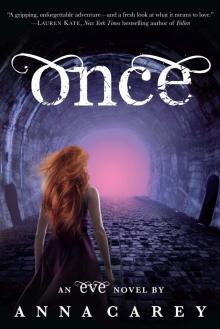 Once
Once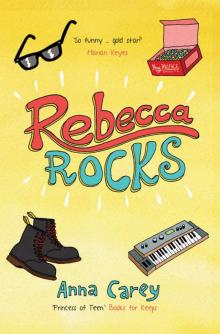 Rebecca Rocks
Rebecca Rocks Blackbird
Blackbird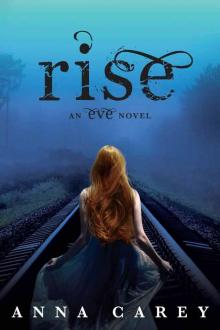 Rise
Rise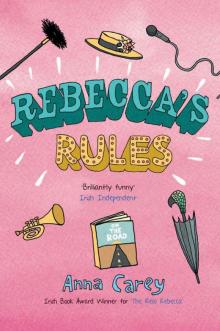 Rebecca's Rules
Rebecca's Rules Deadfall
Deadfall Eve
Eve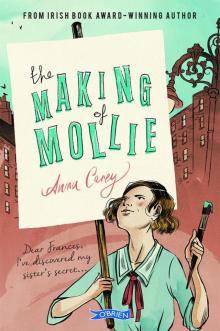 The Making of Mollie
The Making of Mollie Sloane Sisters
Sloane Sisters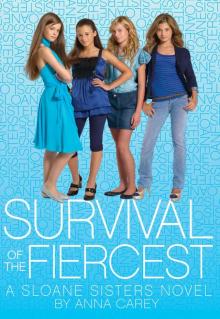 Survival of the Fiercest
Survival of the Fiercest This Is Not the Jess Show
This Is Not the Jess Show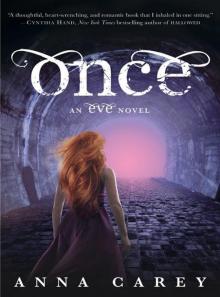 Once: An Eve Novel
Once: An Eve Novel